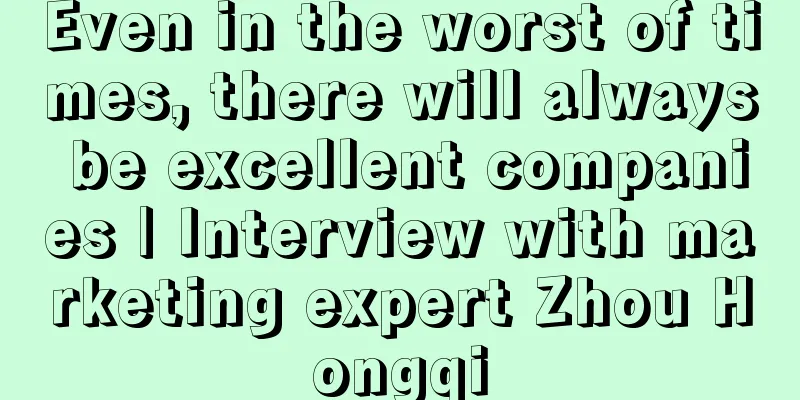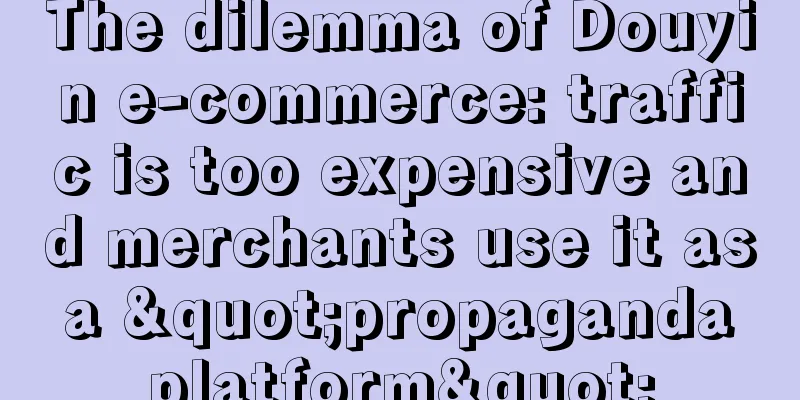Even in the worst of times, there will always be excellent companies | Interview with marketing expert Zhou Hongqi

1. The core difference between the traffic era and the social era is the power of gamesSister Dao Doris: In fact, Professor Zhou is an old friend of Dao Fa. Last year, in order to invite guests to attend Dao Fa's annual summit, I went to the industry to conduct research. Everyone said that Professor Zhou is a rare person who has both academic theory and practical experience. How about Professor Zhou first tell us about your own experience? Zhou Hongqi: I have worked in 6 Fortune 500 companies, responsible for marketing, sales, and management of markets in different countries. But since college, my biggest wish in life has been to be a professor. I like doing research, writing cases, and teaching, so I retired early at the age of 44.5 and became an adjunct professor at the National University of Singapore. To this day, I study new businesses, new models, and new marketing. To put it bluntly, new businesses are enterprises in the new era. The reason why a new enterprise that suddenly emerged can overtake the previous leading enterprises in the industry is that it has a new model, uses innovative business methods, and uses medium and fine-grained marketing strategies. Sister Dao Doris: I would like to add that during his time working for six Fortune 500 companies, Professor Zhou explored many overseas markets. Which countries have you explored? Zhou Hongqi: My first job was at Eli Lilly in Africa, where I worked as a market entry strategy researcher in sub-Saharan Africa, Ivory Coast in West Africa, Kenya in East Africa, and Zimbabwe in Southern Africa. Later, I joined GM, and my work spanned from the United States to Asia. In my 22-year career, I have been responsible for Southeast Asia, Northeast Asia, and Greater China. In particular, I spent 6 years in the 13 most underdeveloped emerging countries in Asia, including Afghanistan, Pakistan, Bangladesh, Sri Lanka, Maldives, Myanmar, Cambodia, etc. I found that different countries and regions have different international business, entry strategies, business methods, and marketing approaches. This has trained me to adapt to diverse cultural values and consumer behaviors so that I can find the most suitable approach in each country. Sister Dao Doris: After listening to Professor Zhou’s experience, I feel that if you don’t listen to this episode, you will miss out on a billion dollars. Because I am very curious about why each person has reached the position he is in today. I would like to ask Professor Zhou, your first job was as a researcher in South Africa. Why did you start with such a role? Zhou Hongqi: I grew up in Taiwan and studied mechanics in college. But with the encouragement of my mentor, I applied to study at the University of Manchester, a business school known as a devil's training camp. There I found that marketing is so rich, with product power, commodity power, value-added, concept, content, and game rules. None of them can be missing. After graduation, I went to work as a market researcher at Eli Lilly and Company. Although it was hard work, I learned three things. First, how to understand a consumer without emotion? We don’t directly ask consumers whether they are willing to buy or not through questionnaires. We look at consumer behavior. Second, what methods can be used to calculate how big this market is? After a product enters the market, how long will the introduction period be? What might be the turning point? After it takes off, how do we warm it up? I am constantly thinking about the entire logic of completing a cold start. Third, the multinational company I worked for would constantly ask me about my inputs and outputs, so I learned how to do the math. I found that marketing is not just about advertising, promotion, and integrated marketing communications. It helps a company think. In the whole process, especially in the market entry strategy, how much time should I invest? When is the break-even point? When will I cross the break-even point? Sister Dao Doris: I am actually very curious about the two concepts Professor Zhou just mentioned. One is called product power and the other is game power. Zhou Hongqi: First of all, a good product is not necessarily a good commodity. When we plan commodities, we mainly plan three things: First, plan your value positioning. Suppose you have 12 advantages. Which ones can be highlighted and which ones can be ignored? This is a rational reason for customers to buy. Second, plan the concept positioning. You need to give customers an emotional reason to buy. For example, SKII actually named it the Ex-Boyfriend Mask, which is too heartbreaking for many women. Third, plan the business positioning. Helena Rubinstein’s main business is the counter business, and La Roche-Posay is the pharmaceutical cosmetics business. You need to think about which business is the main business and the others are auxiliary businesses. Secondly, why is gaming so important? Let me give you an example. Many of our friends eat Little Raccoon instant noodles. This brand has many competitors, but why do so many people choose it? Because it not only has instant noodles, but also a series of small toys. Children can get a badge if they collect 10 of them. People may not know what the badges are, but they think it is fun and they can compete with each other. This is different from traditional gameplay, this is the power of game rules. Sister Dao Doris: This game power really opened my imagination. When people talk about using the Internet to build brands and products, the rules of the game are actually a very important part. 2. The future of CMO is CGO, who must understand both marketing and businessSister Dao Doris: After looking at so many industries and over so many years, what changes do you think have taken place in marketing or business? Zhou Hongqi: Since I became a professor, I have gone through three eras.
In the era of Marketing 3.0, the social model has risen. If you want to find a restaurant, you go to Dianping.com. If the company suddenly has a task, you create a WeChat group. In Marketing Revolution 3.0 written by Professor Philip Kotler, he inadvertently mentioned a new marketing combination - using strong content to hook strong communities, going through many strong scenarios, and generating connections and sales in each scenario. These three eras are not separate processes, but overlapping processes. We cannot say that TV is completely useless, because TV is definitely useful on the day of the Spring Festival Gala; nor can we say that PC is useless, because white-collar workers use PCs for work while browsing their mobile phones. Therefore, for marketers, the complexity of their work is much higher than before. The skills required by marketers are completely different from those we had 20 or 30 years ago. I think the future will be the era of Marketing 4.0. When you open any app, you can set up an intelligent agent that will go through the entire network to accumulate your data, imitate your tone, and understand your temper. More importantly, brands will directly connect with consumers, which is the so-called DTC. Brands can directly push information to end users through social channels and continue to interact with you. Fans will form a self-organization together and then split and promote. These new logics are all happening in Marketing 4.0. Sister Dao Doris: Now let’s talk about your new book, “The Essence of Business”. Can you briefly extract some highlights from the book and tell us what the essence of business is? Zhou Hongqi: I think business means endless growth and prosperity. For example, in 1996, when I was assigned to Shanghai, everyone had to go to the ticket street in Pudong to buy air tickets. But Ctrip started with air tickets and hotels and became everyone's call center. When the PC era came, Ctrip encouraged everyone to buy air tickets on PC, which could save 50 yuan. When mobile social networking came, Liang Jianzhang personally returned to serve as chairman and led Ctrip through transformation. Today, Ctrip's slogan is "With Ctrip in hand, you can go anywhere you want." Business transformation does not mean changing the industry. Ctrip has always sold air tickets and hotels, but because it changed its business model in a timely manner, it has crossed the cycle. To keep up with the new era, a business must be managed, so what should it manage?
The first level is called deciding what to do, and the flow is the decision flow. The most important thing is what sexy products we sell and to what target customers. The second layer is called how to do it, and what is circulated is the workflow. We see how to market, how to sell, where the product technology comes from, how to do supply chain warehousing and logistics, this is called workflow. We change the business model by changing the structure, roles, and business activities of the workflow. The third level is who to find to do the work. We call it the aggregated business symbiosis. Because you need a lot of real people, bringing resources to work together, to do a good business. So we have to design a distribution, called a transaction system, you can't find people to work for nothing. Sister Dao Doris: Just now you talked about the perspective of the boss or CEO, and I was very happy to hear that. But many of our listeners are marketers, who are the boss's assistants. So how can a CMO become a business person? Zhou Hongqi: I have repeatedly emphasized that today the role of CMO has long become CGO, or Chief Growth Officer. CGOs should think about: How can input and output be efficient? Are there any new science and technologies in society? Can we introduce science and technology to make the workflow of the entire business more efficient? One day, the boss will tell you that you must not leave, and we will become partners. You will transform yourself into a businessman. In the past, CMOs were only responsible for integrated marketing or promotion. But I think a CMO will be responsible for market planning, product planning, content planning, integrated marketing, user data management, and brand building in the future. This is the logic of CMO becoming CGO, and CGO being promoted to BU head. 3. The core of Marketing 3.0 is DTC, but many people misunderstand DTCSister Dao Doris: Next, I would like to ask Professor Zhou, where do you think China’s DTC brands will go in the future? Zhou Hongqi: We need to define two different concepts first. Many American DTC brands sell directly to customers through the Internet and interact directly with customers. Therefore, many Chinese brands do not like others to call them DTC, thinking that DTC is e-commerce. But the key to DTC is actually facing consumers directly. There are two types of direct facing. The first is the interactive contact of content through interactive co-creation. The second is direct sales to consumers. We should discuss the first type. Many start-up brands first interact and co-create with users online to gain user favor. But they will eventually grow up and need to distribute products offline and cooperate with distributors. In the future, Chinese DTC brands will use many tools to attract consumers, and they will interact with consumers happily and lively. As for which channels consumers ultimately buy from, I think that is another matter. Sister Dao Doris: Speaking of DTC, we will find that Nike started to implement the DTC strategy several years ago, but recently regretted it. What do you think of the situation that large companies were very obsessed with the DTC strategy for a while, but did not do it well? Zhou Hongqi: Let’s take an example. Dongpeng Special Drink uses a technology that puts a QR code on the bottle cap. When consumers open it and find the one-yuan enjoyment, they will scan the code to become members. Consumers can take the bottle cap to a mom-and-pop store and buy a bottle of beverage worth 3.8 yuan for 1 yuan. Through this action, Dongpeng Special Drink has accumulated 180 million consumers and 3 million mom-and-pop stores in two years. One day, Dongpeng Special Drink discovered that among the 180 million consumers, 40 million were truck drivers, so it offered benefits to encourage truck drivers to fill out questionnaires and give suggestions. Truck drivers complained that a small can of Dongpeng Special Drink did not quench their thirst in summer, but drinking two cans at once was too much and would speed up their heartbeats. So they simply developed a large can, but with a lower dosage. Dongpeng Special Drink did not change its channel structure. It gave concessions to large, mid-sized and small brands to achieve the goal of facing consumers directly, and the terminals started to roll. Speaking of Nike, the biggest challenge in the footwear and apparel industry is the ordering meeting system. After a dealer orders a batch of goods, they cannot sell them and all the goods become inventory. However, the dealer can only exchange the goods or refund 30% of the amount. Therefore, many footwear and clothing industries have set up small-order quick-response models while opening direct-sale stores. Once the products are sold, I will follow up with orders, which will greatly reduce our inventory. This is the logic behind many shoe and clothing brands doing DTC. However, in the process of small orders and quick returns, it is impossible to fully digitize everything from collecting consumer information at the front end to the back end supply chain. Only the first half is efficient, and it is still a half-baked DTC. Different industries face different challenges in the process of DTC, some are easier and some are more difficult. IV. Five dimensions and three points of reference for Chinese brands going globalSister Dao Doris: We just talked about DTC. Going overseas is also a big issue that many people are discussing. Professor Zhou is very familiar with the go to market in so many countries. So what do you think is the overall trend of going overseas? Zhou Hongqi: I teach three courses in the business school, namely marketing, operations, and the strategies and methods for the internationalization of Chinese companies and the localization of international companies in China. I divide domestic overseas expansion into two categories: active overseas expansion and passive overseas expansion. Actively going overseas includes product going overseas, platform-led product going overseas, technology going overseas, and capital going overseas. Perfect Diary’s products are doing well, and we can sell them to countries with a GDP similar to ours, which is product going overseas. The second is the platform going overseas. Platforms like SHEIN will bring many products overseas. The third is technology export. For example, CATL’s largest strategic partner in the United States is Ford. CATL helps Ford plan and operate factories, and Ford pays it for technology. The last one is called capital going overseas. You bought a company and used the existing channel advantages to enter 15 European countries. At the same time, the products of the acquired company also entered China. Going out and welcoming in are two sides of the same coin and cannot be separated. Let's talk about passive overseas expansion. Every industry has leading enterprises. When leading enterprises go overseas, supporting enterprises will follow. For example, BYD will set up a factory in Thailand to make car shells, car glass, and car taillights. Everyone will go overseas together. Passive overseas expansion will be very common in China in the future. Sister Dao Doris: What Chinese brands have gone overseas recently that you think are worth learning from? Zhou Hongqi: On the one hand, there are veterans who have gone global, such as Hisense. More than a decade ago, Zhang Ruimin said that if you want to go global, you must go to the first world. Hisense has continuously improved its product power, and after gaining a foothold in the first world, it has returned to Asia. On the other hand, the current Shaoyin Technology and Anker Innovations are also worth learning from. What can we learn from? First, integrity; second, constantly thinking about workflow; third, constantly thinking about how to integrate into local consumer culture and become a Chinese brand respected by overseas consumers and partners. 5. The essence of business: plan carefully before taking action, gather people to accomplish things, and dynamically upgradeSister Dao Doris: Today, Professor Zhou shared a lot with us from the perspectives of business, marketing, DTC, and going global. Finally, I would like to ask Professor Zhou, everyone has a feeling that the industry is not doing well this year. You have visited many companies. What are your predictions for the future? What do you think are the key points to grasp in branding and marketing in the future? Zhou Hongqi: The economy will go through ups and downs many times in a person's life. If you ask me how much the ups and downs are, I am not an economist and cannot give you an answer. But I want to respond in particular that when the economy enters a new cycle, all consumers, especially those with tight budgets, will want to buy things with better value for money. An enterprise must have a very strong sensitivity and dynamically adjust its thinking. Maybe in a few years, when the economy is on the rise, you will have to quickly replace your downward-thinking mindset and think about why consumers are willing to spend and what the logic behind their behavior is. So I say that we marketers are less likely to get Alzheimer's disease because we encounter different situations every day and have to make judgments and change quickly. This is the charm of our marketing. The greatest charm of the business world lies in change. Many people may think that as a marketer, my career has suddenly hit a stalemate. In fact, don’t think so. If you can keep changing and stand out in a good or bad environment, you are a scarce talent and many people will welcome you. Sister Dao Doris: I think this summary is very good. In fact, what remains unchanged is the demand, and what changes is the form. So Professor Zhou’s answer is to become a marketer who is flexible and business-savvy. Is there anything else you want to share with everyone? Zhou Hongqi: The essence of business is to plan before taking action, to gather people to accomplish things, and to upgrade dynamically. China is changing in small steps, so you should review your business tonight and make plans before taking action tomorrow. If you run a business this week, you should gather all your partners and make plans before taking action next week. What is Gathering People to Get Things Done? It is normal that when your business model changes, the talent you attract will also change. So I say we need to upgrade dynamically. Everyone is in the dynamic world, and you need to welcome and adapt to this dynamic world. This is the essence of business. |
Recommend
The best underwear brand on the Internet, with monthly sales of 500 million on Douyin
On the Douyin e-commerce platform, a Chinese brand...
Is the payment returned by Amazon in full? FAQ about payment returns
In fact, Amazon's business is often based on a...
Children's Day blessings, tell adults
Children's Day marketing is no longer exclusiv...
How does a brand grow?
The elements of brand success are the result of th...
Is it easy to do business in Germany and France on Amazon Europe? What is easy to sell on the German site?
Amazon has 6 sites in Europe, namely Germany, UK, ...
How to play the lucky draw notes on Xiaohongshu? Just read this article!
The lucky draw function should be familiar to Xiao...
What ERP is generally used in cross-border e-commerce? Introduction to the top ten cross-border e-commerce ERPs
Merchants in the cross-border e-commerce industry ...
How much does a small seller of Wish earn in a year? Specific situation analysis
In life, many friends want to join the Wish platfo...
What should I do if a cross-border e-commerce company sends the wrong goods? What are the situations?
There are many merchants doing cross-border e-comm...
Information flow is not the best choice for Xiaohongshu advertising
Whether it is information flow or search, the firs...
How to turn off cash on delivery on Lazada? FAQ
Many novice merchants who have just settled in the...
Why is Shopbop cheaper than the official website? How can I buy it in China?
Shopbop's products are very cheap, and many pe...
Can Amazon upload videos? Any suggestions?
Amazon is a cross-border e-commerce platform. Many...
The Nanny's Guide to Brand Marketing
In this article, the author introduces in detail h...
Just now, Daolang broke the live broadcast record of Video Account!
Daolang's online concert was a huge success on...









